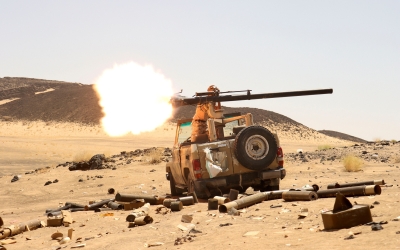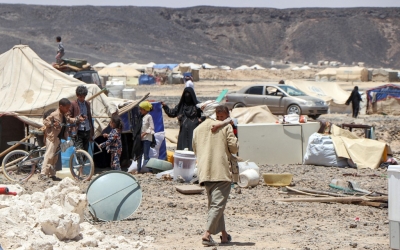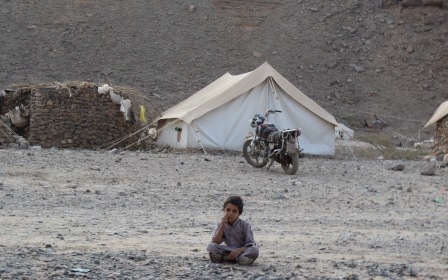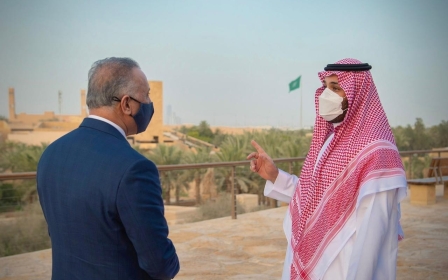US urges easing Saudi restrictions on Yemen's Hodeidah port, Sanaa airport
US special envoy for Yemen Tim Lenderking has urged Saudi Arabia to ease "all restrictions" on the port of Hodeidah and the Sanaa airport, the State Department said on Friday, in an apparent call to end Riyadh's blockade on the war-torn country.
Lenderking, who has been tasked by President Joe Biden with helping facilitate an end to the war in Yemen, returned to Washington from a trip to the Middle East on Friday. He visited Saudi Arabia, Oman and Jordan.
"In Saudi Arabia, he held meetings with senior government officials, including Saudi Crown Prince Mohamed bin Salman, to stress the need to ease all restrictions at Hodeidah Port and Sanaa Airport, reach a comprehensive, nationwide ceasefire, and move to inclusive political talks," the State Department said in a statement.
Message to Houthis
Washington also rebuked Yemen's Houthi rebels for rejecting a Saudi ceasefire proposal and calls for talks.
New MEE newsletter: Jerusalem Dispatch
Sign up to get the latest insights and analysis on Israel-Palestine, alongside Turkey Unpacked and other MEE newsletters
"There is a fair deal on the table that will bring immediate relief to Yemeni people," the statement said.
"The Houthis passed up a major opportunity to demonstrate their commitment to peace and to make progress on this proposal by refusing to meet with UN Special Envoy Griffiths in Muscat - especially given the Republic of Yemen Government's stated readiness to reach an agreement to end the conflict."
The Houthis say lifting Saudi Arabia's air and sea blockade must be a prerequisite to ending the fighting, arguing that the humanitarian situation in Yemen should not be used as a bargaining chip.
Washington, however, dismissed that argument, accusing the rebels of extending the humanitarian crisis with their ongoing assault on the strategic city of Marib.
"Contradictory to their pronouncements regarding the humanitarian situation in Yemen, the Houthis worsen it by continuing to attack Marib and exacerbating dire conditions for already vulnerable, internally displaced Yemenis," the State Department said.
Saudi Arabia and its regional allies began a bombing campaign against the Houthis in March 2015, after the rebels took over Sanaa and toppled the Riyadh-backed government of President Abd Rabbuh Mansour Hadi.
The United Nations calls Yemen the world's worst humanitarian crisis, and the war has killed more than 230,000 people, causing outbreaks of disease and pushing the impoverished country to the brink of famine.
Saudi Arabia views the Houthis as proxies for Iran, but the rebels claim to represent the Yemeni people against what they call the corruption and aggression backed by the kingdom.
The blockade
Early in the war, the Saudi-led coalition imposed an air and sea blockade on Yemen, effectively sealing the country from foreign imports, except for ships cleared by the UN Verification and Inspection Mechanism (UNVIM).
But over recent months, Riyadh has prevented fuel ships inspected by the UN from unloading in Hodeidah, prompting an outcry from rights groups.
No fuel whatsoever was allowed into Yemen in February, and only 38,000 and 83,000 tonnes were allowed in March and April, respectively, compared with 164,000 tonnes in November.
Lenderking played down the effects of the blockade in March, but after backlash from activists and lawmakers, the administration has been raising the issue publicly.
In February, Biden announced an end to all US support for Saudi "offensive operations" in Yemen, while reiterating the US commitment to the kingdom's security. But the exact nature of Washington's military involvement in the conflict remains murky.
Quizzed by lawmakers about the subject last month, Lenderking said he was not in the "information loop" about military activity, deferring questions to the Pentagon.
Middle East Eye delivers independent and unrivalled coverage and analysis of the Middle East, North Africa and beyond. To learn more about republishing this content and the associated fees, please fill out this form. More about MEE can be found here.






